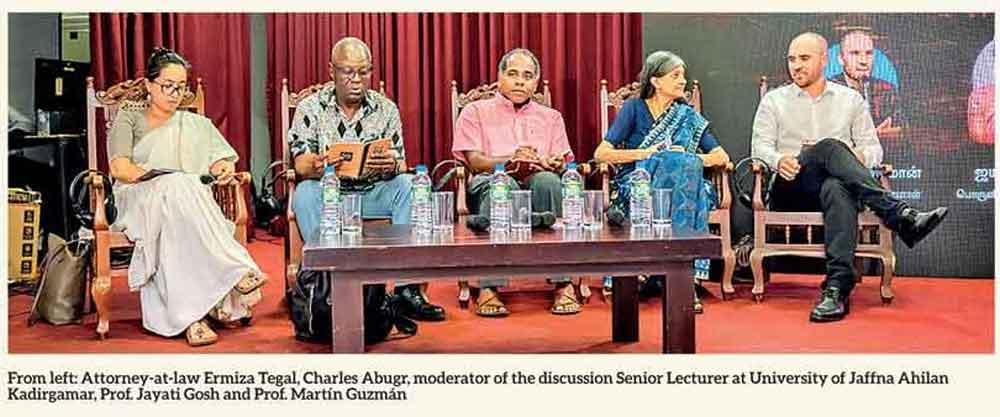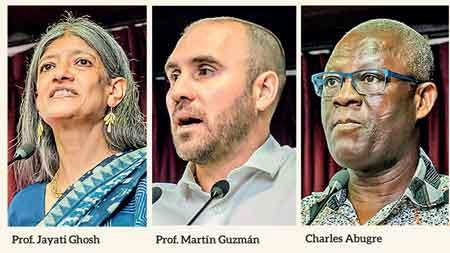13 Jun 2024 - {{hitsCtrl.values.hits}}

 Internationally renowned economic experts who gathered in Colombo ruled that the burden of economic reforms imposed by the International Monetary Fund (IMF) disproportionately impacts ordinary people, small and medium enterprises, and specially women from low-income households.
Internationally renowned economic experts who gathered in Colombo ruled that the burden of economic reforms imposed by the International Monetary Fund (IMF) disproportionately impacts ordinary people, small and medium enterprises, and specially women from low-income households.
Indian economist and International Development Economics Associates (IDEAs) co-founder Prof. Jayati Ghosh made this observations when she addressed a public seminar under the theme “Is There Another Way? Debt Restructuring, IMF and Future of Sri Lanka”. Orgniased by ‘YUKTHI Collective’ coalition of civil society organizations and independent academics the aim of the conference was to ensure that the debt restructuring process in Sri Lanka does not violate the rights of the public.
During her address Prof. Ghosh who is also a Professor from the University of Massachusetts, Amherst, USA and former Professor, Jawaharlal Nehru University, New Delhi, India argued that even though the political decision making had reiterated Sri Lanka has no other way than the IMF there are so many other options to tackle the financial crisis and there are many examples around the world.
Prof. Ghosh advocated for Sri Lanka’s alignment with other debtor countries at the international level, to push back against the IMF and its role in securing the interests of private creditors within powerful countries.
She emphasized the importance of negotiating a fair debt restructuring that does not impose the burden of adjustment on the general public, which is least responsible for the crisis.
In her presentation, Prof. Ghosh drew from a global context to explore the ways in which the IMF encouraged Sri Lanka to borrow from international capital markets, including issuing sovereign bonds. In fact, the economic strategy of capital account liberalization adopted by Sri Lanka since the late 2000s was encouraged by the IMF. Prof. Ghosh emphasised that the charging of high interest rates by private creditors, however, already compensates for the risk of loan non-payment. Accordingly, this factor must be considered in debt restructuring efforts when thinking about how much to repay bondholders, if at all.
Internationally recognized academics and experts discussed their experiences and analyses of Sri Lanka’s current economic crisis, the impacts of IMF reforms and the debt restructuring process on people, and alternatives Sri Lanka can adopt to manage the current crisis better.
Drawing experiences from his own country former Minister of Finance of Argentina, Prof. Martín Guzmán discussed different elements of debt restructuring.
Prof. Guzmán, a Professor from Columbia University explained that Argentina for example, is a country that has faced a continuous economic crisis since the early 2000s because of its exposure to external debt. Prof. Guzmán led Argentina’s debt restructuring in 2020, the second largest in the world after Greece’s, with a fifty-five percent reduction in the value of sovereign bonds.
Prof. Guzmán emphasised that countries with external debt crises should develop their own programme for debt restructuring when they fall into such a crisis, with which they can compare and push back against the IMF’s approach. He mentioned that there is no systematic mechanism for debt restructuring in the current international law. Therefore, it is necessary to negotiate with different creditors and reach an agreement with them separately.
Prof. Guzmán stressed the crucial role of bargaining power in this process. He asserted that countries must have clear national policies on monetary, fiscal, and productivity-related matters to negotiate effectively. He challenged the perception that countries have no choice but to adhere to the IMF’s directives, which he argued is an illusion. Drawing from his experience in Argentina, Prof. Guzmán emphasised the importance of developing an alternative Debt Sustainability Analysis (DSA) independent of IMF calculations. He cited Argentina’s successful completion of a debt restructuring programme as evidence of the feasibility and usefulness of such alternatives in the negotiation process.
The other international expert from Ghana, Charles Abugre Executive Director IDEAs drew comparisons between Ghana’s external debt crisis and Sri Lanka’s.
He highlighted a significant issue concerning the economic advice offered by the International Monetary Fund (IMF). He observed that like Sri Lanka, Ghana has similarly relied on recurring IMF programmes throughout its history, yet both countries have ended up in crisis. He underscored that the notion that the IMF is an impartial entity offering purely technical advice is flawed. Instead, he suggested, politics is key to understanding how it operates.
Abugre emphasised the need for Sri Lanka to engage in discussions with the IMF based on its own national agenda rather than accepting the IMF’s recommendations without question.
29 Dec 2024 10 minute ago
29 Dec 2024 1 hours ago
29 Dec 2024 3 hours ago
29 Dec 2024 3 hours ago
29 Dec 2024 3 hours ago